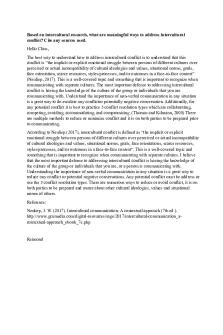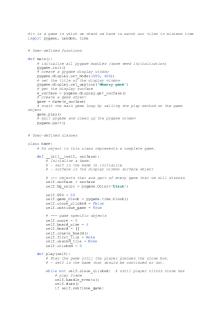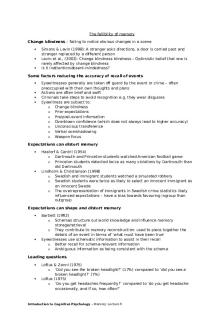Week6 Memory Activity - Professor Kristina Backer PDF

| Title | Week6 Memory Activity - Professor Kristina Backer |
|---|---|
| Course | Cognative Neuroscience |
| Institution | University of California, Merced |
| Pages | 3 |
| File Size | 89.7 KB |
| File Type | |
| Total Downloads | 40 |
| Total Views | 148 |
Summary
Professor Kristina Backer...
Description
COGS 130: Cognitive Neuroscience Week 6 Discussion Section: Memory The purpose of today’s Discussion Section activity is to review and apply the material we have covered so far on Memory. Please work through this activity in small groups.
Part 1. Testing the Different Forms of Memory Imagine that you are a neuropsychologist, and a patient has just come to your clinic who is experiencing trouble with his memory. Working with a team of neuropsychologists and neurologists, your goal is to figure out which form(s) of memory are affected. 1) Which type of scan should be ordered to check the patient’s brain structure to determine if and where any lesions are located?
2) Now, you should describe a task to test each form of memory, to determine which memory system(s) are affected. You can work together with your team to describe and/or design a task to measure the patient’s performance for each of the following forms of memory. a) Sensory Memory (Which sensory modality(ies) would you like to test and how would you do it?)
b) Working Memory (How would you test both the maintenance and manipulation aspects of working memory?)
1
c) Priming (What sort of priming task would you use, for example, word stem or word fragment task, or a priming task involving pictures?)
d) Semantic Memory
e) Episodic Memory
f) Procedural Memory
2
~ If time permits, please feel free to continue onto Part 2. If you run out of time, that’s okay; we will be discussing this during lecture. Part 2. Designing an fMRI Study: Why are some things remembered better than others, especially with respect to long-term memory? (We will be discussing this in-depth during Tuesday’s lecture, but it’s good to start thinking about this question now.) 1) To start, what are the 3 stages of memory in general?
2) Let’s say you do an experiment in which the participants (young, healthy adults) are instructed to remember some stimuli that they will subsequently be tested on – at the end of the experiment. a) Draw out how you would design this task: what happens during the encoding phase, in terms of the stimuli? What happens during the retrieval phase, in terms of the stimuli and how the participants respond?
b) When analyzing the fMRI data, what types of contrasts would you do? In other words, which different conditions would you contrast – for example, to examine why some stimuli were remembered and why some were forgotten? Would you look at BOLD activity from the encoding phase, the retrieval phase, or both phases?
3...
Similar Free PDFs

Week6
- 1 Pages

BLO1105-Tut-Week6 - Law
- 3 Pages

Chapter 1 - Kristina Mack
- 4 Pages

Memory
- 3 Pages

Memory
- 5 Pages

Week6 - week 6
- 4 Pages

Marketing principles week6 2020
- 10 Pages

ACCY112 Tutorial 6 - week6
- 11 Pages

Week6 dynamic programming 2
- 7 Pages

S0274817 PA3 Week6 - assignment
- 4 Pages
Popular Institutions
- Tinajero National High School - Annex
- Politeknik Caltex Riau
- Yokohama City University
- SGT University
- University of Al-Qadisiyah
- Divine Word College of Vigan
- Techniek College Rotterdam
- Universidade de Santiago
- Universiti Teknologi MARA Cawangan Johor Kampus Pasir Gudang
- Poltekkes Kemenkes Yogyakarta
- Baguio City National High School
- Colegio san marcos
- preparatoria uno
- Centro de Bachillerato Tecnológico Industrial y de Servicios No. 107
- Dalian Maritime University
- Quang Trung Secondary School
- Colegio Tecnológico en Informática
- Corporación Regional de Educación Superior
- Grupo CEDVA
- Dar Al Uloom University
- Centro de Estudios Preuniversitarios de la Universidad Nacional de Ingeniería
- 上智大学
- Aakash International School, Nuna Majara
- San Felipe Neri Catholic School
- Kang Chiao International School - New Taipei City
- Misamis Occidental National High School
- Institución Educativa Escuela Normal Juan Ladrilleros
- Kolehiyo ng Pantukan
- Batanes State College
- Instituto Continental
- Sekolah Menengah Kejuruan Kesehatan Kaltara (Tarakan)
- Colegio de La Inmaculada Concepcion - Cebu





